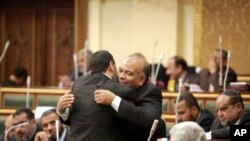Egypt's newly elected interim People's Assembly met for the first time Monday, amid heated debate over whom to elect as its new speaker. Muslim Brotherhood's candidate, Saad Katatni, won the post. The Brotherhood won 235 seats in the 498 seat chamber. That is causing worries in some quarters.
The dominance of the Muslim Brotherhood in the new parliament leadership has some Egyptians concerned because of the group's longstanding positions on issues like women's rights, minority rights, and Islamic shariah law.
The Brotherhood, whose slogan is “Islam is the solution,” won 47 percent of the vote in three rounds of parliamentary elections, stunning some secular observers. Egyptian publisher Hisham Kassem, a long-time democracy advocate, admits to having been taken by surprise by the strong showing of Islamic fundamentalist groups.
“I never was so off-track as I was with my forecast for the parliamentary elections. I didn't see the Salafi party having any presence. I forecast 10 seats for them and I didn't think the [Muslim] Brotherhood would exceed 20 percent," said Kassem.
Egypt's fundamentalist Salafi party, the Hezb al-Nour or Party of Light, wants the clock to be turned back and life to be lived as it was in the time of Islam's prophet during the Seventh Century. The Muslim Brotherhood and the Salafis agree on some points, but disagree on others.
Hisham Kassem stresses that he's not afraid to live under Muslim Brotherhood leadership, so long as the group abides by several key rules.
"I have fought for free elections and believe in them and this has been the outcome, and even though this is not my political persuasion, I accept it and we need to engage politically with the Brotherhood and hope that they will abide [by] good governance and rotation of power, and that they will hold an election, when it's time for a next election," said Kassem.
Top Muslim Brotherhood figures have met with U.S. officials in recent weeks, including Deputy Secretary of State William Burns, Assistant Secretary of State for Middle East Affairs Jeffrey Feltman and U.S. Ambassador to Egypt Anne Patterson. Many observers say that the Brotherhood does not want to adopt any extreme positions, so as to frighten the international community.
Omar Ashour, who teaches political science at Britain's University of Exeter, argues that the Brotherhood wants to maintain good relations with both the international community and the country's ruling military council.
"Any confrontation with the international community will reflect badly on the economy and a clash with the military will reflect badly on politics. So, I think what they will try to do is avoid a clash with these two big entities and it doesn't really matter if they have the house speaker. They are trying to avoid being in the front line, too visible and holding direct responsibility," he said.
Egypt's new interim People's Assembly will play a prominent role in writing the country's new constitution. Many secularists fear that a heavily Islamic assembly will try to impose Islamic shariah law on the country. Ashour, however, believes that the Muslim Brotherhood has more important issues to deal with right now than tackling the divisive issue of shariah law.
"I think they have other priorities at the moment," said Ashour. "They need to consolidate power in the parliament, to influence the constitutional assembly that will be formed. They will need to be very influential in terms of constitutional crafting. They will need to focus on the military establishment, on one side they don't want to confront, but on the other side they don't want it to have too much influence in politics because it will undermine them. So, they have too many battles and I don't think the shariah battle is going to be fought unless there's a bit of outbidding from the Salafi side and they will have to say something to their audience."
Christian Egyptian telecom mogul Najib Sawiris, who heads the country's Free Egyptian Party which won 9 percent of the seats in parliament, has said in the past that he was categorically opposed to the imposition of shariah law on Egyptians.
Still others who belong to Egypt's business community or the secular bourgeoisie worry that shariah law will irrevocably change the country's character, forbidding consumption of alcohol, forcing women to wear Islamic veils, imposing strict segregation of the sexes and imposing Islamic banking on the financial sector.
Despite recent assurances from several Islamic Brotherhood figures that the group will not make draconian changes to Egypt's style of life, some businessmen are said to have been quietly trying to take their money out of the country, and some Christians and Western-educated individuals have been quietly emigrating.
Muslim Brotherhood Parliament Speaker Creates Worries for Some




